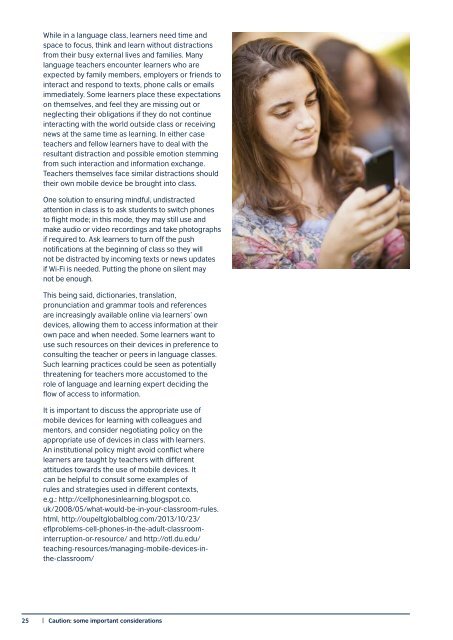E485 Mobile pedagogy for ELT_FINAL_v2
E485 Mobile pedagogy for ELT_FINAL_v2
E485 Mobile pedagogy for ELT_FINAL_v2
Create successful ePaper yourself
Turn your PDF publications into a flip-book with our unique Google optimized e-Paper software.
While in a language class, learners need time andspace to focus, think and learn without distractionsfrom their busy external lives and families. Manylanguage teachers encounter learners who areexpected by family members, employers or friends tointeract and respond to texts, phone calls or emailsimmediately. Some learners place these expectationson themselves, and feel they are missing out orneglecting their obligations if they do not continueinteracting with the world outside class or receivingnews at the same time as learning. In either caseteachers and fellow learners have to deal with theresultant distraction and possible emotion stemmingfrom such interaction and in<strong>for</strong>mation exchange.Teachers themselves face similar distractions shouldtheir own mobile device be brought into class.One solution to ensuring mindful, undistractedattention in class is to ask students to switch phonesto flight mode; in this mode, they may still use andmake audio or video recordings and take photographsif required to. Ask learners to turn off the pushnotifications at the beginning of class so they willnot be distracted by incoming texts or news updatesif Wi-Fi is needed. Putting the phone on silent maynot be enough.This being said, dictionaries, translation,pronunciation and grammar tools and referencesare increasingly available online via learners’ owndevices, allowing them to access in<strong>for</strong>mation at theirown pace and when needed. Some learners want touse such resources on their devices in preference toconsulting the teacher or peers in language classes.Such learning practices could be seen as potentiallythreatening <strong>for</strong> teachers more accustomed to therole of language and learning expert deciding theflow of access to in<strong>for</strong>mation.It is important to discuss the appropriate use ofmobile devices <strong>for</strong> learning with colleagues andmentors, and consider negotiating policy on theappropriate use of devices in class with learners.An institutional policy might avoid conflict wherelearners are taught by teachers with differentattitudes towards the use of mobile devices. Itcan be helpful to consult some examples ofrules and strategies used in different contexts,e.g.: http://cellphonesinlearning.blogspot.co.uk/2008/05/what-would-be-in-your-classroom-rules.html, http://oupeltglobalblog.com/2013/10/23/eflproblems-cell-phones-in-the-adult-classroominterruption-or-resource/and http://otl.du.edu/teaching-resources/managing-mobile-devices-inthe-classroom/25 | Caution: some important considerations


